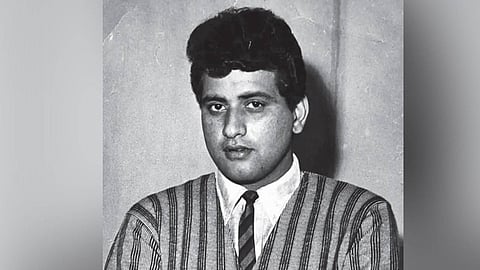‘Shaheed’ to ‘Roti Kapda…’: Nationalism of Hindi cinema’s Bharat Kumar lives on
One of my last enduring memories of actor-filmmaker Manoj Kumar is of him wearing an orange Shirdi Sai Baba bandana, wheelchair-bound but in great cheer, receiving the Dadasaheb Phalke award for 2015 from then President Pranab Mukherjee.
A rare public appearance for someone who had nearly retreated into anonymity though his brand of patriotic cinema has seen a major rejuvenation in the last decade.
It wouldn’t be an exaggeration to say that identifying Kumar with earnest flag-waving started with his most seminal performance as Bhagat Singh the revolutionary. S Ram Sharma’s 1965 film ‘Shaheed’, supposedly ghost-directed by Kumar, has given generations of Indians goosebumps, especially moments like Bhagat Singh with his palm on a burning candle taking the vow to lay down his life for the nation in the Prem Dhawan composition sung by Mohammad Rafi -- “Aye watan aye watan, humko teri kasam, teri raahon mein jaan tak luta jaayenge”. Or Bhagat Singh, Rajguru and Sukhdev cheerfully singing another Dhawan song -- “Mera rang de basanti chola” -- on their way to getting executed.
Kumar’s on-screen nationalism grew in a more categorical context —that of the 1965 Indo-Pakistan war. It also owed allegiance to the then PM Lal Bahadur Shastri, who, as per an unconfirmed legend, was so impressed with Kumar in ‘Shaheed’ that he approached him to direct a film based on his slogan “Jai Jawan, Jai Kisan” and ‘Upkar’ (1967) was born.
Kumar’s directorial debut had him play ‘Bharat’, a farmer-turned-soldier and highlighted the kisan-jawan contribution to the progress of the nation by symbolically juxtaposing a gun against the plough. Kumar himself referred to the film as “Bharat ka 16,000-foot lamba celluloid flag of India”. Music brought things full circle with “Mere desh ki dharti”, composed by Kalyanji
Anandji, written by Gulshan Bawra and sung by Mahendra Kumar emerging as one of the most popular patriotic Hindi film songs of all time.
Bharat became Kumar’s adopted name in ‘Purab aur Paschim’ (1970), ‘Roti Kapda Aur Makaan’ (1974), ‘Kranti’ (1981) and ‘Clerk’ (1989), the reason why he came to be called Bharat Kumar of Hindi cinema. It is in the Indira Gandhi-era ‘Roti Kapda Aur Makaan’ that Kumar cast a more complex and critical gaze at the state of the nation. There is no enemy out there — no Britain or Pakistan—but the issues within, of unemployment and poverty.

